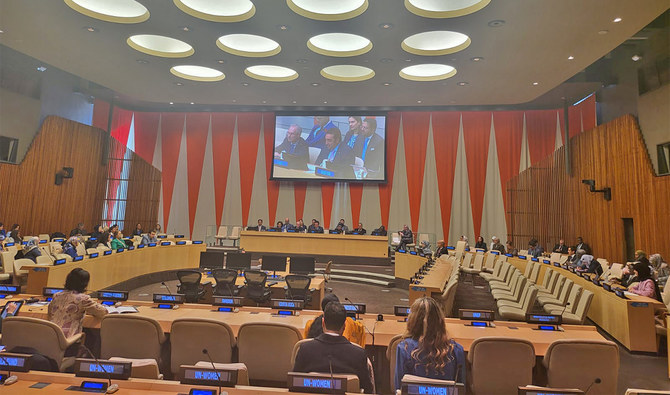PARIS: China deployed its embassies to spread doubts about the performance of French-made Rafale jets after they saw combat in India and Pakistan’s clashes in May, French military and intelligence officials have concluded, implicating Beijing in an effort to hammer the reputation and sales of France’s flagship fighter.
Findings from a French intelligence service seen by The Associated Press say defense attaches in China’s foreign embassies led a charge to undermine Rafale sales, seeking to persuade countries that have already ordered the French-made fighter — notably Indonesia — not to buy more and to encourage other potential buyers to choose Chinese-made planes.
The findings were shared with AP by a French military official on condition that the official and the intelligence service not be named.
Four days of India-Pakistan clashes in May were the most serious confrontation in years between the two nuclear-armed neighbors, and included air combat that involved dozens of aircraft from both sides. Military officials and researchers have since been digging for details of how Pakistan’s Chinese-made military hardware — particularly warplanes and air-combat missiles — fared against weaponry that India used in airstrikes on Pakistani targets, notably French-made Rafale fighters.
Sales of Rafales and other armaments are big business for France’s defense industry and help efforts by the government in Paris to strengthen ties with other nations, including in Asia where China is becoming the dominant regional power.
France is fighting what it calls a disinformation campaign against the Rafale.
Pakistan claimed its air force downed five Indian planes during the fighting, including three Rafales. French officials say that prompted questions about their performance from countries that have bought the fighter from French manufacturer Dassault Aviation.
India acknowledged aircraft losses but didn’t say how many. French air force chief Gen. Jérôme Bellanger said that he’s seen evidence pointing to just 3 Indian losses — a Rafale, a Russian-made Sukhoi and a Mirage 2000, which is an earlier generation French-made jet. It was the first known combat loss of a Rafale, which France has sold to eight countries.
“Of course, all those, the nations that bought Rafales, asked themselves questions,” Bellanger said.
French officials have been battling to protect the plane from reputational damage, pushing back against what they allege was a concerted campaign of Rafale-bashing and disinformation online from Pakistan and its ally China.
They say the campaign included viral posts on social media, manipulated imagery showing supposed Rafale debris, AI-generated content and video-game depictions to simulate supposed combat. More than 1,000 social media accounts newly created as the India-Pakistan clashes erupted also spread a narrative of Chinese technological superiority, according to French researchers who specialize in online disinformation.
French military officials say they haven’t been able to link the online Rafale-bashing directly to the Chinese government.
Intelligence assessment says Chinese officials lobbied potential clients to ditch French planes but the French intelligence service said Chinese embassy defense attaches echoed the same narrative in meetings they held with security and defense officials from other countries, arguing that Indian Air Force Rafales performed poorly and promoting Chinese-made weaponry.
The defense attaches focused their lobbying on countries that have ordered Rafales and other potential customer-nations that are considering purchases, the intelligence service said. It said French officials learned of the meetings from nations that were approached.
Asked by AP to comment on the alleged effort to dent the Rafale’s appeal, the Ministry of National Defense in Beijing said: “The relevant claims are pure groundless rumors and slander. China has consistently maintained a prudent and responsible approach to military exports, playing a constructive role in regional and global peace and stability.”
In recent years, China has stepped up disinformation campaigns on global social media platforms like X, Instagram or Facebook, using networks of state-sponsored influencers, sites that pose as news organizations, and fake social media accounts to spread narratives from Beijing.
France’s Defense Ministry said the Rafale was targeted by “a vast campaign of disinformation” that “sought to promote the superiority of alternative equipment, notably of Chinese design.”
’Strategic French offering’
“The Rafale was not randomly targeted. It is a highly capable fighter jet, exported abroad and deployed in a high-visibility theater,” the Defense Ministry wrote on its website.
“The Rafale was also targeted because it represents a strategic French offering. By attacking the aircraft, certain actors sought to undermine the credibility of France and its defense industrial and technological base. The disinformation campaign therefore did not merely target an aircraft, but more broadly a national image of strategic autonomy, industrial reliability, and solid partnerships.”
Dassault Aviation has sold 533 Rafales, including 323 for export to Egypt, India, Qatar, Greece, Croatia, the United Arab Emirates, Serbia and Indonesia. Indonesia has ordered 42 planes and is considering buying more.
China may be hoping to weaken the security relationships that France is building with Asian nations by spreading worries about the equipment it supplies, said Justin Bronk, an airpower specialist at the Royal United Services Institute, a defense and security think tank in London.
“From a point of view of limiting Western countries’ influence in the Indo-Pacific, it would make sense for China to be using the performance of Pakistani weapon systems — or at least purported performance — in downing at least one Rafale as a tool to undermine its attractiveness as an export,” he said.
“They certainly saw an opportunity to damage French sales prospects in the region.”
















